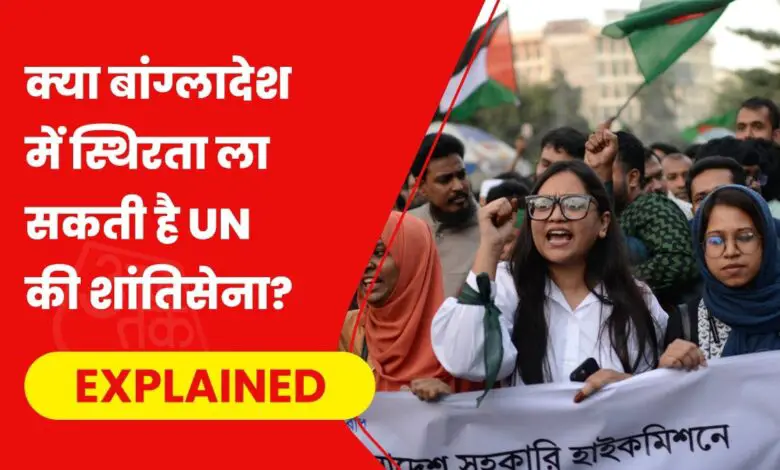mamata banerjee UN peacekeeping force in bangladesh – Under what circumstances is UN peacekeeping force deployed in a country, whom Mamata Banerjee demanded to send to Bangladesh – mamata banerjee demanded intervention of UN peacekeeping force in bangladesh amid violence on hindu minority mdj

In August, the then PM of Bangladesh Sheikh Hasina took refuge in India. Since then, the tension between the two countries is increasing. There are continuous reports that minorities, especially Hindus, are being targeted there. A few days ago, taking major action, the government there arrested many religious officials including Chinmoy Krishna Das associated with ISKCON. After this, anger has increased in India also. People are protesting against Bangladeshi policies. In this context, West Bengal CM Mamata Banerjee demanded to send UN peacekeeping force there.
What is CM Mamta’s argument?
Mamta says that whenever a boat from Bangladesh reaches the Indian border, we treat them leniently. Even give concessions in many other cases. There is violence against minorities due to change of government. The PM himself should put this matter on the United Nations platform and talk about sending peacekeeping force there. Till now Mamata had avoided speaking on minority in Bangladesh saying that it is an issue of another country. Now for the first time she is speaking openly. But there is a technical deficiency in their demand. Peacekeeping force is not deployed just like that, there is a complete protocol for it.
What is Shantisena, how does it work?
Whenever there is mutual or internal tension among the member countries, the United Nations sends its peacekeeping force there. The foundation of this army was laid in the year 1948, whose objective was to bring peace between Israel and Arab countries. In later times its scope kept increasing. At present, soldiers from more than 120 countries are deployed in it, including Indians. Some time ago, when there was fighting between Israel and Hezbollah, concerns were also raised over the safety of Indian soldiers during Israeli attacks on Lebanon.
Does peacekeeping force also fight wars?
No. The soldiers working in different countries for peacekeeping are real soldiers in their country, but after being part of the peacekeeping force, they do not participate in the fighting. Their job is to work for peace while remaining impartial. However, if there is an attack on them or civilians, they are fully prepared to stop it. For example, in the sixties, UN peacekeeping forces took military action against rebel groups and foreign mercenaries in Congo. Similarly, during the Rwandan genocide in 1990, the peacekeeping force fought a war.
What was the catch in Mamata Banerjee’s demand?
Mamta says that India should request the UN to send peacekeeping forces to Bangladesh. There is a technical deficiency in this matter. Although Peacekeeping Force lives in every unstable country, it cannot go there on its own will. For this he needs the permission of the host country.
When a peacekeeping force is sent to a country, there is a Status of Forces Agreement between the host and the United Nations. In this, the legal status of the peacekeepers, their responsibilities and how much freedom they will have, all this is decided. If at any time the host country feels that the peacekeeping force is interfering in its country, then the UN has to withdraw the force. In the latest case, the army will be able to go there only on the wish of Bangladesh and not on the interference of neighboring countries. One thing in this is that the army does not interfere in the domestic affairs of any country until the country is on the verge of collapse.
So is deployment in Bangladesh impossible?
No. Shantisena can go there also but only if both the parties involved in the conflict give consent to it. In the India-Bangladesh case, approval is required from the governments of both the countries. If an army leaves a country without its consent, questions arise about its impartiality.
Many times countries do not allow peacekeeping forces to come to their places.
– During the civil war in Syria, the UN could not send its troops there even if it wanted to because the Syrian government did not allow it.
– In 2019, the government of Sudan had asked the UN to withdraw the force because it felt that it was a threat to the sovereignty of its country.
Has there been controversy over Shantisena also?
UN peacekeeping forces have been repeatedly accused of spying for the US or other countries in the UN Security Council. Many times allegations of political interference were also made. In 2000, Israel had claimed about UNIFIL that its soldiers were spying for Hezbollah and providing information about the movements of the Israeli army. In 2004, the United Nations Mission in Haiti was accused of espionage. Although the United Nations kept denying them, these claims raised questions on its credibility.
There have even been serious allegations of sexual exploitation and abuse against peacekeepers deployed in Congo. Many soldiers exploited the women and children there. After the outcry, the UN itself admitted that some peacekeepers had misused their rights.




